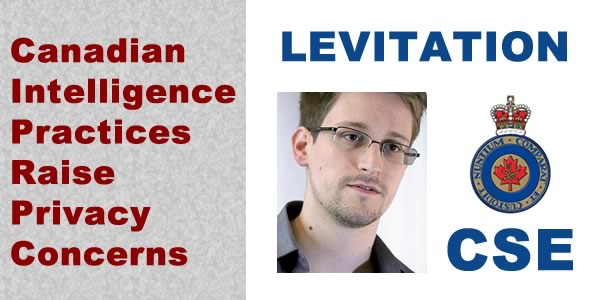Our comprehensive report on surveillance in Canada is available. Download it here.
Snowden Files Reveal CSE Project Levitation Threatens Privacy
- January 31, 2015

On Monday January 26th, David Lyon gave a talk in conjunction with a showing of the Edward Snowden documentary Citizen Four at the Screening Room, the independent cinema in Kingston, Canada. In a review of the documentary Lyon points to the chilling affect mass surveillance has on the expression of democratic rights and freedoms, noting that in the current climate everyone is a target.[1] The following day CBC news released one of Snowden’s files, which detailed the Levitation project led by the Communications Security Establishment (CSE). In the article, University of Toronto Professor Ron Deibert is quoted as describing the project as a ‘giant x-ray machine’. [2] The release was coordinated in partnership with The Intercept, which notes that the data is collected through tapping into Internet cables and not through the cooperation of companies. [3] The project sifts through ten to fifteen million downloads around the world each day with the number of interesting events in the range of a few hundred. While Canadian law prohibits the CSE from targeting Canadian citizens the leaked document shows IP addresses associated with Canadian cities. [4]
On the same day that the CBC released the Snowden file on Project Levitation, the Parliamentary Assembly of the Council of Europe released a statement about the threat that mass surveillance poses to human rights. In a resolution on mass surveillance drafted by Rapporteur Pietr Omtzigt it is repeatedly stated that the assembly is ‘deeply concerned’ about mass surveillance practices and the threat they pose to democratic society. [5] Omtzigt refers to an evolving surveillance-industrial complex that could escape ‘democratic control and accountability’. [6] He argues the Snowden files are proof that intelligence agencies, particularly those among the ‘Five Eyes’ avoid national level law by sharing data on each other’s citizens. The sharing of information between agencies underscores the difficulties citizens face in terms of recourse. In addition to the unlikeliness that citizens are even aware of their privacy being compromised, there are increasing numbers of foreign intelligence agencies violating their right to privacy. It is incumbent upon the international community to design legislation that affords greater protection for citizens as they faced increased risk of being targeted by the expanding global surveillance assemblage.
[1]Lyon, “A Surveillance Winter: The Chilling Effect on Freedom.”
[2]Hilderbrandt, Pereira, and Seglins, “CSE Tracks Millions of Downloads Daily.”
[3]Gallagher and Greenwald, “Canada Casts Global Surveillance Dragnet Over File Downloads.”
[4]Hilderbrandt, Pereira, and Seglins, “CSE Tracks Millions of Downloads Daily.”
[5]Omtzigt, Mass Surveillance.
[6]Ibid.
References:
Gallagher, Ryan, and Glenn Greenwald. “Canada Casts Global Surveillance Dragnet Over File Downloads.” The Intercept, January 28, 2015. https://firstlook.org/theintercept/2015/01/28/canada-cse-levitation-mass....
Hilderbrandt, Amy, Michael Pereira, and Dave Seglins. “CSE Tracks Millions of Downloads Daily: Snowden Documents.” CBC, January 27, 2015. http://www.cbc.ca/1.2930120.
Lyon, David. “A Surveillance Winter: The Chilling Effect on Freedom.” The Kingston Whig-Standard, January 22, 2015. http://www.thewhig.com/2015/01/22/a-surveillance-winter-the-chilling-eff....
Omtzigt, Pieter. Mass Surveillance. Parliamentary Assembly, Council of Europe, January 26, 2015.





